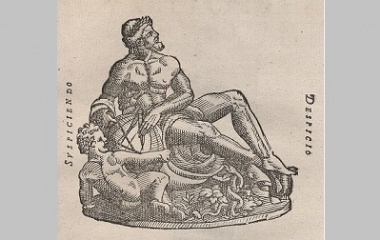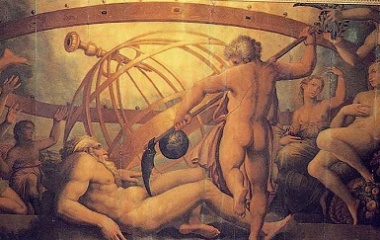- Origin: Greek
- Role: God of the sky
- Wife: Gaia
- Children: The Twelve Titans
Who Is Uranus?
In Greek mythology, Uranus was the god of the sky. There are several variations of his origins. Some say he was conceived by Gaia, who would become his wife, while others say that he was the son of Aether and Gaia. Others say that he did not have traditional parents and instead born from the primal form of the universe. His Roman equivalent was Caelus. While Uranus was a well-respected god in early mythology, history suggests he was mostly forgotten by followers during Classical times.
Purpose
Uranus was one of the first gods, and was known as Father Sky. Myths don’t go into too much detail regarding his duties but what they do tell us is that without Uranus, Greek mythology would have taken a much different turn. He and Gaia were responsible for some of the most important gods and beings found throughout Greek myths and legends.
Origins
It was widely believed that Uranus did not have parents. Instead, he was brought to life by Chaos, the first form of the universe. But Hesiod wrote that the god was born of Gaia, who he then married. Other philosophers speculate that Uranus was born from Aether and Hemera while Orphic Hymns suggest he was the son of Nyx. Uranus’ origins will always be up for debate, based on the variations of his myth.
Legends and Stories
Uranus did not reign for eternity. He was eventually overthrown by his children. But that doesn’t mean his myths disappeared. Learn some of the myths surrounding his creation and the story that tells how he was overthrown and the immediate consequences.
How Uranus Came to Power
In Greek mythology, Chaos is the name given to the primal force that existed before all the gods. Chaos was alone for quite some time but suddenly, from out of the void, Erebus appeared, the place of death. Night also emerged. The universe was still, silent, and dark, until Love appeared and became the catalyst for creation. Light was born from Love, and Gaia, the earth, was born from Light.
Night and Erebus gave birth to Ether, the heavenly light. They also conceived Day, the light of the earth. Without Erebus, Night gave birth to the evils that plagued humans, including Doom, Sleep, Death, Nemesis, Fate, and Dreams. At the same time, Gaea conceived Uranus alone, who became the ruler of the sky. Uranus and Gaea eventually wed and they produced multiple offspring, including three Hecatoncheires, three Cyclopes, and the most famous of their children, the twelve Titans.
Uranus is Overthrown
Uranus feared his children, especially the Titans, who were named Oceanus, Coeus, Crius, Hyperion, Iapetus, Theia, Rhea, Mnemosyne, Phoebe, Tethys, and Cronus. As each one was born, he cast them into the depths of earth. This did not settle well with Gaia, who loved her children. She encouraged the Titans to seek revenge and their freedom. But she knew they would need her help.
Gaia carved a sickle and presented it to Cronus. Variations of the myth say he acted alone while others say that Iapetus, Coeus, Hyperion, and Crius helped their brother. Either way, Cronus attacked Uranus with the sickle and castrated him, throwing the removed body parts into the ocean.
As a result, Aphrodite emerged from the ocean as Uranus’ daughter. But because of his son’s actions, Uranus was dethroned and Cronus became the leader of the Titans. He released his siblings from imprisonment. Cronus and Thea wed and gave birth to the first Olympians. But Uranus and Gaia informed Cronus of a prophecy that sounded very familiar to him. One of his children would overthrow him. This was the first indication of the Titanomachy, the war between the Titans and the Olympians. Therefore, it can be said that without Uranus, Greek mythology would have taken a much different turn.
Family
Uranus had a large family, with the majority of popular Greek mythology figures being a descendent. His most famous children include the twelve Titans, along with the Cyclopes, named Brontes, Steropes, and Arges. Uranus and his wife Gaea were also the parents of the Hecatoncheires, named Cottus, Briareos, and Gyges. His grandchildren were the Olympians.
But Uranus produced offspring in an unconventional manner as well. When he was castrated, his blood splattered onto the earth. From his blood emerged the Erinyes, the Meliae, and the Giants. From the sea, his genitals produced the goddess Aphrodite, who would become one of the most important Greek goddesses. But there are conflicting myths regarding her birth. Homer wrote that she had a more traditional birth, with her parents being Zeus and Dione.
Appearance
In artistic representations, Uranus is depicted as an older man with white hair. He has facial hair, usually curly, and is shown with a somber look on his face. In some presentations, he is above the earth, symbolic of his role as Father of the Sky.
Symbology
The sky is the main symbol of Uranus, which he presided over. Another common symbol associated with the god is the sickle, the tool used by his son to overthrow him.











what are his powers?
this is helpful
Gaia carved a sickle and presented it to Cronus. Variations of the myth say he acted alone while others say that Iapetus, Coeus, Hyperion, and Crius helped their brother. Either way, Cronus attacked Uranus with the sickle and castrated him, throwing the removed body parts into the ocean.
As a result, Aphrodite emerged from the ocean as Uranus’ daughter
How did Uranus died.